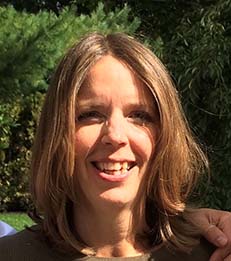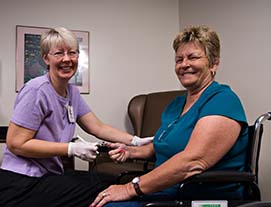This publication is the third of a four-part series shining a spotlight on ALS multidisciplinary care.
Each member of the team at an ALS multidisciplinary clinic plays an important role in delivering critical care for people living with ALS and their families. Association-wide liaisons work closely with ALS clinics nationwide, ensuring each patient’s unique needs and wishes are being addressed throughout their journey living with ALS.
“The involvement of the chapter liaison at clinic, and the entire local chapter care services team, play a crucial role for the ALS multidisciplinary clinic team,” says Lori Banker-Horner, senior director of clinical programs at The ALS Association. “The chapter liaison is an essential member of the clinic team, working closely with chapter members living with ALS, caregivers and families during and in- between clinic visits, providing information and connecting them with chapter programs, so they receive the best coordinated care possible.”

We recently spoke with Suzanne Schrag, senior director of care services for The ALS Association Rocky Mountain Chapter, and clinic liaison to ALS multidisciplinary clinics across Colorado and Utah. Over the past 15 years working with the Association, Suzanne has worked with more than 2,000 families impacted by ALS.
What brought you to work at The ALS Association Rocky Mountain Chapter?
I have always felt pulled toward case management type of work and supporting people in all aspects of their life, not just the immediate need of the moment. I had worked with a friend in a nursing home rehab center and treated a woman who was initially diagnosed with a stroke before finally being diagnosed with ALS. We reached out to the Rocky Mountain Chapter of the Association for assistance with a communication device for her, and the impact on the women’s quality of life after receiving the device was incredibly significant. I was so impressed that there was an organization that could help in that way. When I learned that the chapter was looking for a care services coordinator, I knew it was what I wanted to do.
Can you describe your position and role at the chapter?
After 12 years working as a care services coordinator, I moved into the position of Senior Director of Care Services. In my new role, I manage the chapter’s programs, guide the Care Services team in their work with our families and provide up-to-date ALS education to the team members, clinicians and the ALS community as a whole. In addition, like the rest of our care team, I work directly with a caseload of families which keeps me connected to people living with ALS and their families and caregivers. I feel this is necessary to help keep me grounded in our mission, ensuring my continued understanding of what families impacted by ALS are going through day-to-day as the ALS community landscape continues to evolve.
From your perspective working with the chapter, what do you think are the benefits of multidisciplinary care for people living with ALS?
ALS affects so many different aspects of a person: emotionally, socially, and of course the various physical changes. The model of the multidisciplinary clinic in bringing together numerous clinicians with their particular specialties allows for the collaboration and coordination of the practices, taking a holistic approach to treating the unique needs of the whole person. This type of collaboration enriches the lives of all those impacted by ALS.
What is your role as the Association’s liaison at an ALS clinic?
My overall role is to assist in pulling all the pieces together. I help to educate and inform the various clinicians in the practicality of living with ALS day-to-day and how their recommendations translate into the day-to-day life of living with this disease, because it’s different with each and every person. Each visit I share the necessary details and background information to the entire clinic team including home life situations, recent life changes and assist in developing a plan specific to each individual’s needs and goals for their personal journey living with ALS.
After clinic visits, I provide follow up communication with our families, ensuring their needs are being met. These include everything from helping with local resources, providing further disease education based on each visit, assisting with assistive technologies and durable medical equipment and providing guidance navigating difficulties and barriers they may encounter with the healthcare system.

What does a typical day at the clinic look like for you?
The day starts early, before the patients even arrive at clinic. I assist the clinic coordinator with the logistics of the day, setting up the rooms where the families will meet with the clinicians and checking in with everyone regarding any pertinent changes or updates on the patients we will see throughout the day. In team meetings, we discuss each patient, what their goals and current needs are and discuss strategies for care, anticipating upcoming changes to help prepare families for new challenges they face in the future.
Throughout the day, I meet individually with each of the families, sharing information, resources and programs available through the chapter to help them. During the course of the day, multiple conversations occur between me and the different clinicians to be sure we are working together to fulfill the same goals and wishes as set by each patient and family directly.
In our after-clinic team meeting, we review and discuss where the patients are currently in their disease progression and recommendations that were given during their visit to make sure we are all prepared for next steps in treatment. This helps me to prepare for follow up with each family that is needed by myself and the Care Services team.
The ALS Association is committed to making ALS a livable disease. What role do you see multidisciplinary care will play in making that a reality?
No two ALS journeys are alike. I see the clinic’s role as providing the specialized critical care their patients need while addressing the needs of each unique patient and their families and caregivers, focusing on the goals they have about what they want or how they plan to live with the disease.
The definition of quality of life means different things to different people. Recognizing our roles and how we can best assist each patient in maintaining the quality of life they desire is key to helping them remain safe while mitigating potential harms. Respecting their wishes while guiding them through healthcare recommendations ultimately helps ease the physical, emotional and social impacts that ALS may create.

What do you like most about your position working with families impacted by ALS and the ALS community?
That’s a great question and I think about it quite often. Friends and family ask often what I like most about my job and it is such a hard answer to give. I enjoy all aspects of what I do, but the most impactful one for me is working with these amazing families. Though we can’t change an ALS diagnosis for someone (not yet anyway), being able to help them navigate this journey they are on and help make it just a bit less difficult is incredibly fulfilling for me. Knowing that our Care Services team is there to offer resources, guidance, education, medical equipment and most importantly, support, is so gratifying. Seeing the love of these families and friends, their determination, grace, humor and dignity is truly a gift and I hope I am able to absorb many of these important traits in myself each day.
Special thanks to Suzanne and the team at The ALS Association’s Rocky Mountain Chapter for allowing us to share her unique perspective about the importance of multidisciplinary ALS care and her experience working with the ALS community.
To learn more about multidisciplinary ALS care and The Association’s Certified Treatment Centers of Excellence and Recognized Treatment Centers Program, visit our website HERE. To continue to learn more about the disease and follow stories about people living with ALS in the community, follow our blog at als.org/blog


Comments
Our son Stephen was diagnosed with ALS in September 2018 while living in Superior CO. In October 2018 Suzanne was the ALS care services coordinator who became our first introduction to the ALS association and community and was able to provide us a roadmap as to what we could expect in our upcoming ALS journey. She demonstrated to us a deep personal commitment and understanding as to the difficulties we would be facing which enable my wife and I as well as our son to better navigate this journey! We can’t think of a better person to fulfill the position she currently has and feel confident that she will maximize all the skills and talents of the multidisciplinary team to make those who make this very demanding and difficult journey!
Bill and Ann Dupree
Join the conversation. Please comment below.